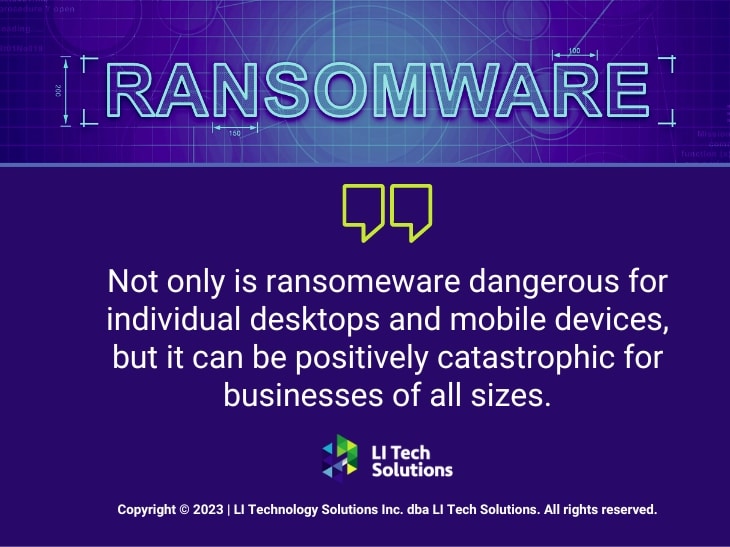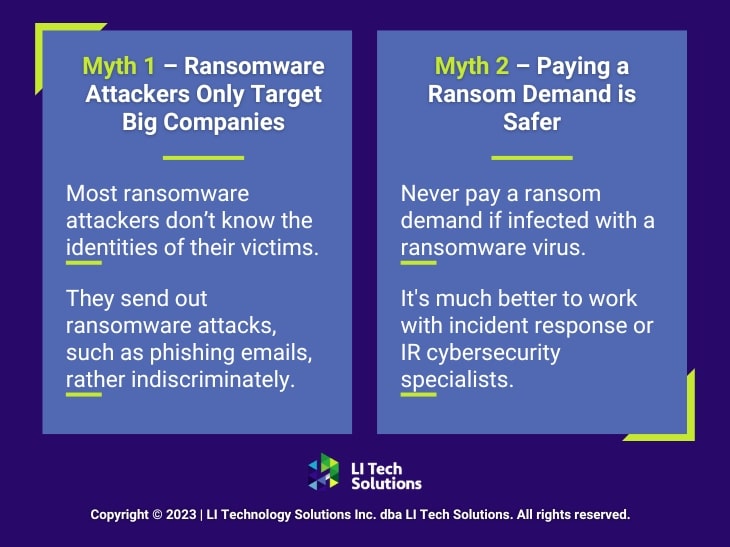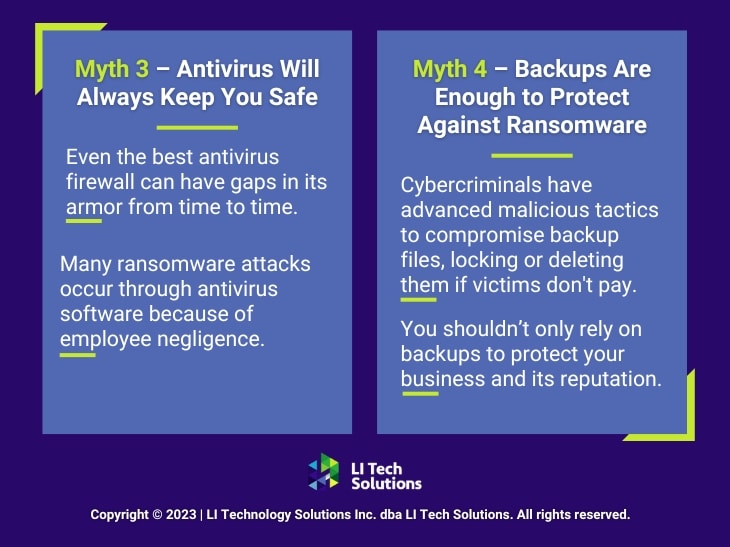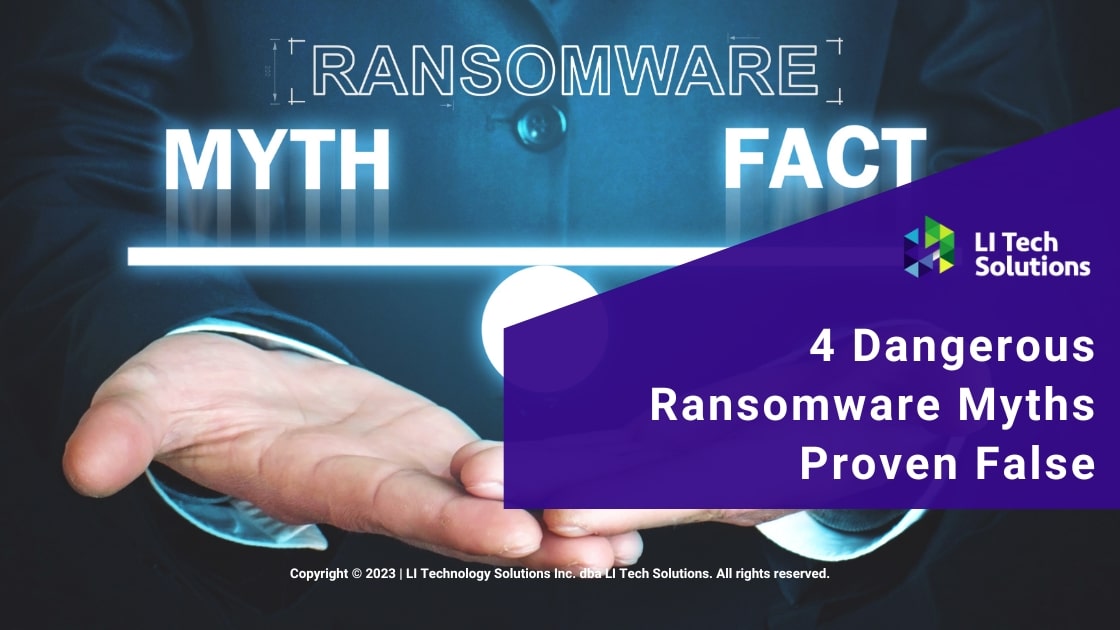4 Dangerous Ransomware Myths Proven False
What Is Data Protection? Why It’s Important and Why Cybersecurity Can’t Be Separate
Ransomware is one of the most pervasive and dangerous forms of malware or computer virus. Not only is it dangerous for individual desktops and mobile devices, but it can be positively catastrophic for businesses of all sizes in Long Island, NYC.
A ransomware attack occurs when a virus installs itself on a device, like a desktop or phone. It finds and encrypts sensitive data or locks down the device completely unless a ransom is paid, usually in cryptocurrency like Bitcoin.
Unfortunately, many business owners believe that they are safe from ransomware, or believe other harmful myths about this digital threat. Today, we’ll bust four myths about ransomware so you’re better equipped to protect yourself and your business in the future.

Myth 1 – Ransomware Attackers Only Target Big Companies
Many small to mid-sized business owners erroneously believe that their enterprises are safe from ransomware attacks. They think ransomware cybercriminals only target big businesses with tons of customers and lots of extra money in the bank. This is not true in the slightest.
In truth, most ransomware attackers don’t know the identities of their victims. They send out ransomware attacks, such as phishing emails, rather indiscriminately. If they get anyone to install the virus on a computer terminal, they’ve succeeded. Most individuals don’t know what to do, and will pay the ransom out of desperation.
According to a Cybersecurity Special Report by the U.S. Chamber of Commerce and RSM, 23% of middle-market company executives reported at least ransomware ransom or attack in 2022. This demonstrates how any brand can be vulnerable to ransomware attacks, not just big businesses.
If you think your small business is safe just because you’ve been fortunate enough not to run into a ransomware attack yet, think again. Sooner or later, you and your employees will know what to do when you’re targeted (albeit blindly) by a ransomware-armed cybercriminal.
Myth 2 – Paying a Ransom Demand is Safer
By nature, each ransomware virus demands a ransom from its victim. Some business owners and individuals think that paying the ransom demand is safer, especially if the ransom message says that the criminal will delete sensitive data or expose sensitive files if payments aren’t made ASAP.
In truth, you should never pay a ransom demand if a device is infected with a ransomware virus. Ransomware creators can’t be trusted – they’re criminals, after all. More importantly, there’s nothing stopping those criminals from carrying out whatever ill ideas they have in mind after you fork over the cash.
It’s a much better idea to work with incident response or IR cybersecurity specialists. They can deal with ransomware attacks, evaluate the situation, and help you get access to sensitive data quickly without having to pay the bad actors. Even if paying the ransom is the right move, you should only do it with a cybersecurity negotiator on your team.
Whatever you do, don’t keep a ransomware attack to yourself. Inform your employees or your cybersecurity specialists so the proper response can begin at the earliest opportunity.

Myth 3 – Antivirus Will Always Keep You Safe
Strong antivirus software is certainly a great tool in your overall digital defense toolkit. However, it won’t universally keep yourself or your company safe from ransomware and other malware attacks.
The truth is that digital defenses must constantly keep up with newly evolving viruses and cyber attack threat vectors. Even the best antivirus firewall can have gaps in its armor from time to time. Therefore, a new ransomware virus that hasn’t been detected and studied before might slip through and attack your business’s sensitive files.
Furthermore, many ransomware attacks occur through antivirus software because of employee negligence. One of the most common vectors for ransomware is a phishing email, which is a scam email that installs a virus onto a user terminal when it is opened.
Therefore, you can’t just rely on antivirus to keep your enterprise safe. You must also:
- Use regular cloud security monitoring for your sensitive files. Such monitoring and alert you as soon as a cyber breach is detected
- Train your employees to recognize and avoid ransomware threats. For instance, teaching your employees basic cyber hygiene skills, like not opening suspicious-looking emails, can do wonders to reduce the vulnerability of your business to ransomware attacks
Myth 4 – Backups Are Enough to Protect Against Ransomware
It might be tempting to think that backing up your sensitive data is enough to protect you if the worst comes to pass if your business crashes with a ransomware attack. However, backups can’t always be relied upon to save the day, nor can they always protect your brand from reputational damage amongst your customers.
In fact, many cybercriminals now have advanced malicious tactics to compromise backup files, locking them down or deleting them if ransomware victims don’t pay the fines.
So-called double extortion attacks involve cybercriminals encrypting and stealing data at the same time. So even if you do have a backup of key data ready to go, the criminals can still leak that sensitive data unless you pay the demanded ransom.
Given these threats, you shouldn’t merely rely on backups to protect your business and its reputation. Instead, keep the above tips in mind – such as training your employees and hiring cybersecurity specialists – to shore up your business’s digital defenses as much as possible.
Are You Properly Backing Up Your Business Data?

Contact LI Tech for the Best NY Cybersecurity Assistance
As you can see, ransomware is far more dangerous than you may have initially realized. Even though some of your ideas about ransomware have been busted, remember that you can protect your business and your personal files by working with the right security partners.
At LI Tech, our capable specialists can draw up a list of security best practices for you and your employees to follow. We also offer a spread of managed cloud security services in Long Island, NYC. Contact us today to see how we can keep you safe from ransomware.

